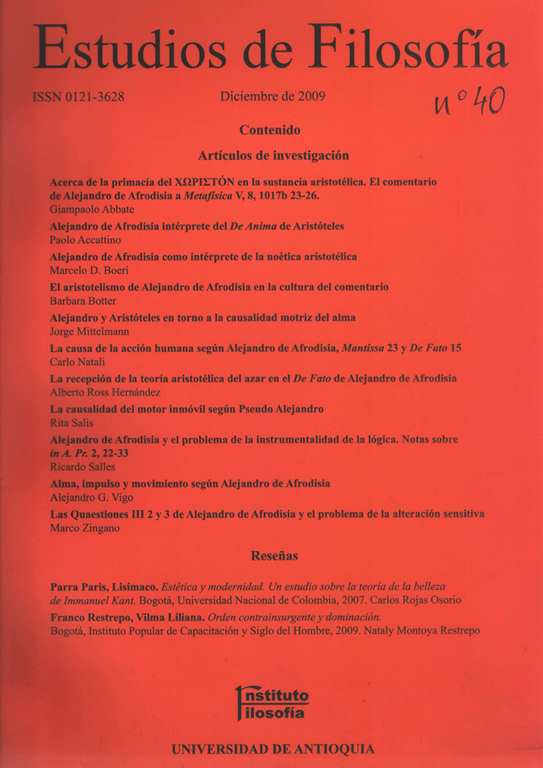Alexander of Aphrodisias as an interpreter of the Aristotelian noetics
DOI:
https://doi.org/10.17533/udea.ef.11616Keywords:
Aristotle, Alexander, psychology, noethicsAbstract
this essay intends to show that, despite the relevance of Alexander’s interpretation of Aristotle’s agent intellect (the intellect that Alexander indentifies with god), such an interpretation cannot be right due to reasons of systematic order that go against some basic Aristotelian premisses, both ontological in general and noetical and psychological in particular. In the development of his essay, Boeri highlights some arguments and explanations provided by Pseudo Philoponus, who (rightly according to him) is concerned with encompassing the issue of the intellect on the psychological side, which presupposes that the intellect must have a bodily support. A consequence of this examination, Boeri suggests (i) that not only Alexander’s interpretation of intellect does not constitute a correct exegesis of Aristotle’s De anima III 5, but that (ii), when identifying the agent intellect with the intellect “coming from without”, with god, and with the first cause, Alexander introduces an important incoherence within his own psychological conception, which acknowledges Aristotle’s thesis that the psychological states “exist” through the body.
Downloads
References
ACCATTINO, P. Alessandro di Afrodisia. De anima II (Mantissa). Premessa, testo rivisto, traduzione e note di Paolo Accattino (con la collaborazione di Pietro Cobetto Ghiggia). Alessandria, 2005.
ACCATTINO, P., DONINI, P. Alessandro di Afrodisia. L’anima. Traduzione, introduzione e commento a cura di Paolo Accattino e Pierluigi Donini. Roma-Bari, 1996.
BARNES, J. “Aristotle’s Concept of Mind”, en: Barnes, J., Schofield, M., Sorabji, R. (eds.) Articles on Aristotle (Psychology and Aesthetics). London, 1979, pp. 34-41.
BOERI, M. D. Aristóteles. De anima. Traducción, estudio preliminar, notas y apéndice por Marcelo D. Boeri. Buenos Aires, 2009.
BOERI, M. D. Aristóteles. Física VII-VIII. Traducción, introducción y comentario. Buenos Aires, 2003.
BOERI, M. D. “μήτ ̓ ἄνευ σώματος εἶναι μήτε σῶμά τι ἡ ψυχή (Aristóteles, De anima 2. 414 a 19-20). A propósito del alcance de las interpretaciones funcionalistas de la psicología aristotélica y del carácter causal del alma”, en: Elenchos (Rivista di studi sul pensiero antico), Anno XXX (2009) Fascicolo 1 (en prensa).
BRUNS, I. Alexandri Aphrodisiensis. Praeter Commentaria. Scripta Minora. De anima liber cum Mantissa (Supplementum Aristotelicum 2.1). Berlin, 1888 DOI: https://doi.org/10.1515/9783111673776
BRUNS, I. Alexandri Aphrodisiensis Scripta Minora. Quaestiones, De Fato, De Mixtione (Suplementum Aristotelicum 2.2). Berlin, 1892.
CASTON, V. “Aristotle’s Two Intellects. A Modest Proposal”, en: Phronesis, 44, Issue 3, 1999, pp. 199-227. DOI: https://doi.org/10.1163/15685289960500033
CHARLTON, W. Philoponus. On Aristotle on the Intellect. Translated by William Charlton with the assistance of Fernand Bossier. London, 1991.
DONINI, P. L., ACCATINO, P. “Alessandro di Afrodisia, DA90. 23sqq. A propósito del νοῦς θύραθεν”, en: Hermes, vol. 122, N° 3, 1994, pp. 373-375.
FREDE, M. “La théorie aristotélicienne de l’ intellect agent”, en: Romeyer Dherbey, G. (ed.) Corps et âme. Sur le De anima d’ Aristote. Études reúnies par C. Viano. Paris, 1996, pp. 377-390.
FRONTEROTTA, F. “ARISTOT: DE ANIMA 5. 430 A 23-5”, en: Elenchos, XXVIII, fasc. 1, 2007, pp. 79- 104. DOI: https://doi.org/10.1515/elen-2007-280104
GERSON, L. Aristotle and other Platonists. Ithaca, 2005. DOI: https://doi.org/10.7591/9781501716966
MORAUX, P. Alexandre d’Aphrodise: Exégète de la noétique d’Aristote. Liege-Paris, 1942.
MOVIA, G. Aristotele. L’ anima. Introduzione, traduzione, note e apparati di Giancarlo Movia. Milano, 2001.
NUYENS, F. L’ evolution de la psychologie d’ Aristote. Louvain, 1973. (1a ed. 1948).
RIST, J. “Notes on Aristotle De anima 3.5”, en: Classical Philology, vol. 61, N° 1, 8-20, 1966. DOI: https://doi.org/10.1086/365077
RODIER, G. Aristote. Traité de l’âme. Paris, 1900.
SALIS, R. Il commento di pseudo-Alessandro al libro della Metafisica di Aristotele. Soveria Mannelli, 2005.
SHARPLES, R. W. Alexander of Aphrodisias. De anima libri mantissa. Berlin-New York, 2008. DOI: https://doi.org/10.1515/9783110978995
SHARPLES, R. W. Alexander of Aphrodisias. Quaestiones 1.1-2.15. London, 1992.
THEILER, W. Aristoteles. Über die Seele. Berlin, 1994.
ZINGANO, M. Razão e Sensação em Aristóteles. Porto Alegre, 1998.
Downloads
Published
How to Cite
Issue
Section
Categories
License
Copyright (c) 2009 Estudios de Filosofía

This work is licensed under a Creative Commons Attribution-NonCommercial-ShareAlike 4.0 International License.
Authors who publish with this journal agree to the following terms:
1. The Author retains copyright in the Work, where the term "Work" shall include all digital objects that may result in subsequent electronic publication or distribution.
2. Upon acceptance of the Work, the author shall grant to the Publisher the right of first publication of the Work.
3. The Author shall grant to the Publisher a nonexclusive perpetual right and license to publish, archive, and make accessible the Work in whole or in part in all forms of media now or hereafter known under a Creative Commons Attribution-NoCommercia-ShareAlike (CC BY-NC-SA 4.0), or its equivalent, which, for the avoidance of doubt, allows others to copy, distribute, and transmit the Work under the following conditions: (a) Attribution: Other users must attribute the Work in the manner specified by the author as indicated on the journal Web site;(b) Noncommercial: Other users (including Publisher) may not use this Work for commercial purposes;
4. The Author is able to enter into separate, additional contractual arrangements for the nonexclusive distribution of the journal's published version of the Work (e.g., post it to an institutional repository or publish it in a book), as long as there is provided in the document an acknowledgement of its initial publication in this journal;
5. Authors are permitted, and Estudios de Filosofía promotes, to post online the preprint manuscript of the Work in institutional repositories or on their Websites prior to and during the submission process, as it can lead to productive exchanges, as well as earlier and greater citation of published work (see The Effect of Open Access). Any such posting made before acceptance and publication of the Work is expected be updated upon publication to include a reference to the Estudios de Filosofía's assigned URL to the Article and its final published version in Estudios de Filosofía.















